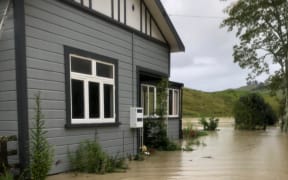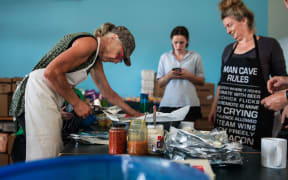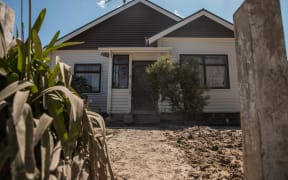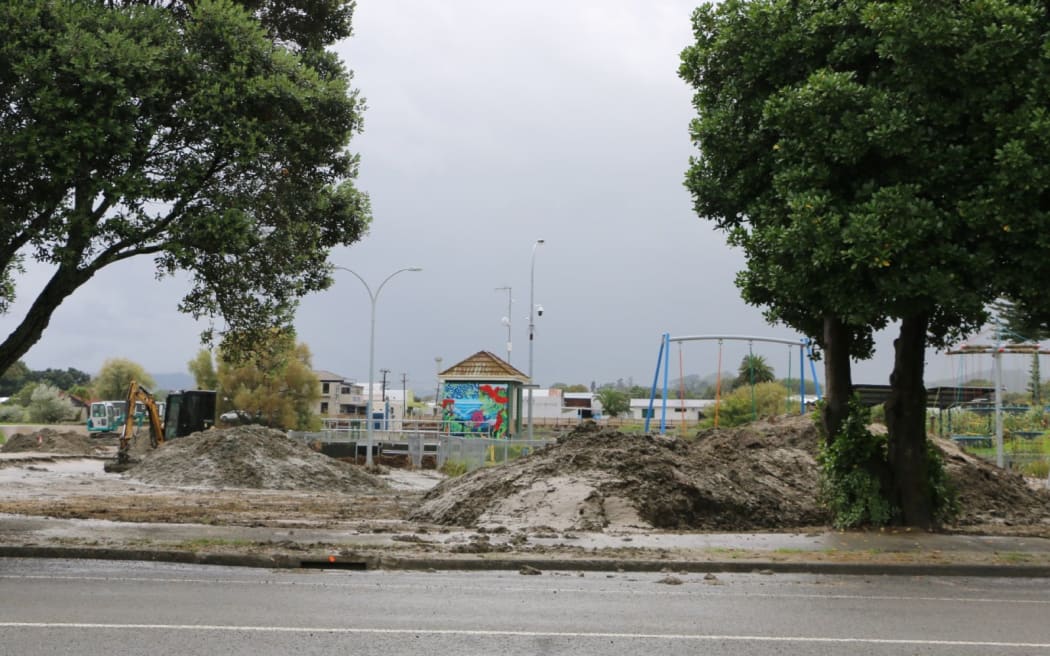
Destruction left behind by Cyclone Gabrielle. Photo: Jamie Tahana / RNZ
In Wairoa, there is a collective sense of dread that comes whenever the sky turns grey, a pall of anxiety that descends whenever the rain returns.
Three weeks on from Cyclone Gabrielle, when the snaking Wairoa river rushed over its banks, consuming the entire north side of town in about 20 minutes, residents are still tidying up.
But the rain returned on Monday, the drops quickly pooling behind drains still blocked, turning the cement-like silt back into a slushy, difficult mud.
It meant a sleepless night for Leon Symes, the head of post-settlement iwi organisation Tātau Tātau o Te Wairoa.
"We're still on edge," he said. "I woke up in the middle of the night with a heavy anxiety. Whānau are on edge, there's that tension about the rain."
Deputy Mayor Denise Eaglesome-Karekare, who lost her home at the now-destroyed Takitimu Marae, said she looked to the sky with dread everytime the rain returned. For many here, it brings the trauma of the floods back. It also makes a cleanup that has still got a long way to go that much harder.
"The silt that's still on our sections - and I say ours because I'm one of those impacted - turns to mud with the rain, and we can't do anything there. It's quite depressing," she said in an interview at the old bank building where she works her 'day job' linking rangatahi with training and apprenticeships, which the town is hoping to do with the rebuild.

Denise Eaglesome Karekare. Photo: Jamie Tahana / RNZ
It is three weeks since a wall of water rose around dawn, spilling through the north end of town and topping it with tonnes of silt. More than 100 homes have been condemned, and so have several businesses and Takitimu Marae, which holds special significance for Ngāti Kahungunu.
Eaglesome-Karekare said efforts since had been significant. Mountains of silt, ruined furniture, taonga and family possessions have been cleared away. Contractors, helped by the army, have gone from house to house, helping clear and clean. Politicians have flown in, promising to help Wairoa for the long haul.
But the deputy mayor is sceptical of promises, as Wairoa faces daunting prospects for recovery.
"I had some very wise woman say to me, 'Well, you're sexy right now, but in a couple of weeks everyone's going to leave you and you're going to be on your own.' She's right. That's what's going to happen.
"Central government needs to step up, they haven't yet. There's all this money promised, we haven't seen that yet."
Three weeks on, the wounds of Cyclone Gabrielle are still fresh in this town. New shoots of green grass slowly rise through piles of silt, now zig-zagged with large cracks.
Diggers and trucks still go back and forth from the worst-affected suburb - North Clyde - with the latest load of debris, while crops and trees lie wilted, fences lie where they were thrown by the current, rotting plants still caught in their mangled wire.
Whānau are still busy scraping their gardens with shovels, or ripping carpet from their houses, large yellow stickers plastered on the window reading "restricted access."
At the Wairoa Showgrounds, Sue Wilson of the Wairoa A&P Society is cleaning up. Trying to dry out what was salvaged, she flicks through historic books, their covers withered by water and mud.
The town was due to hold a big farming expo the weekend after the cyclone, but now, the grounds lie covered in mud that squelches underfoot.
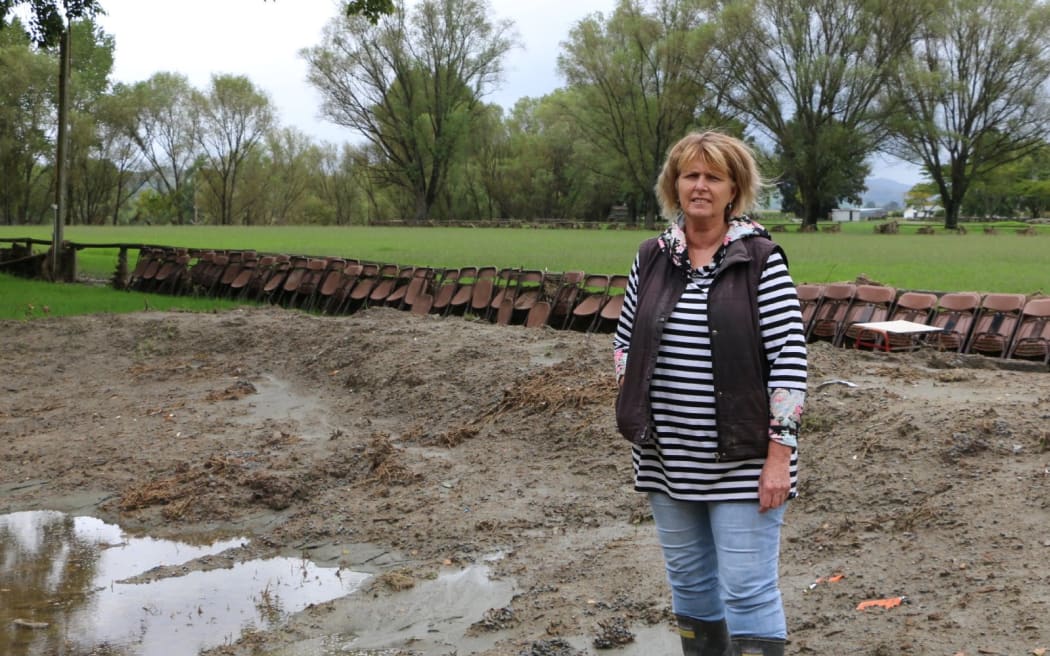
Sue Wilson. Photo: Jamie Tahana / RNZ
The pavillion had water waist-high, the river bursting its way through the roller-door, forcing its way into every room inside. It moved furniture from one side of the building to the other. It ripped piping out from the kitchen, even opening the oven door and filling the appliance with silt.
"The current was so swift it just moved [the silt] all into the buildings, all around the buildings and just took anything in its path," she said. "It pushed its way through the big roller doors in the buildings and munted anything in its way."
Wilson pointed to a pony shed nearby, its corrugated iron walls curled outwards by the force of the water.
Across Wairoa more than 100 houses have been either red- or yellow-stickered, the council said, leaving hundreds homeless in a town that was already hamstrung by a housing crisis.
Eaglesome-Karekare said many are still staying in marae. Many more have moved in with friends or whānau, creating crowded conditions. Others have no other option, living in yellow-stickered houses with no power or running water. The town had a bout of Covid-19 last week, and there are fears for respiratory illnesses as mould takes hold.
The deputy mayor says these are many of the poorest whānau who could not afford insurance.
"We've got people in yellow-stickered homes who have got nowhere else to go. To move them to somewhere where they don't know is not an option either. So we need to get some sort of accommodation on their whenua so they can clean up."
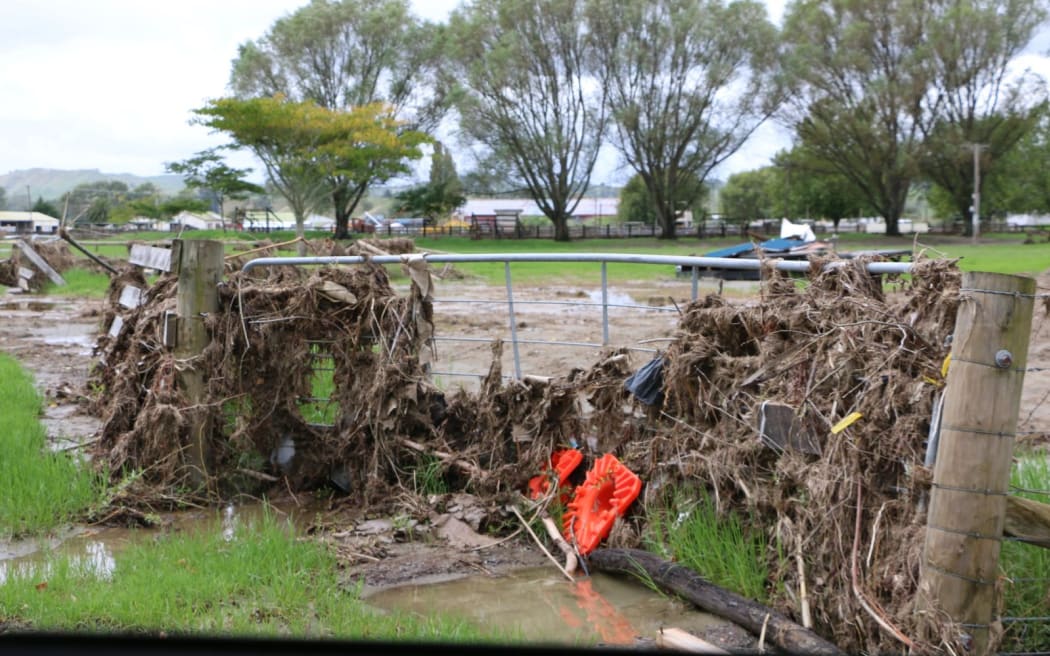
Destruction in Wairoa following Cyclone Gabrielle. Photo: Jamie Tahana / RNZ
Symes, of Tātau Tātau o Te Wairoa - which he said had taken a lead role in recovery efforts in this predominantly Māori town - said housing was the key issue. They were trying to find cabins, caravans, flat-pack houses - anything - to act as a temporary solution.
The road to recovery for Wairoa is going to be a long haul. The highway to Napier remains severed, and it is likely to stay that way for months. The road to Gisborne is open, but its position is precarious, with the land above and below the windy highway still sodden and moving.
In rural areas around isolated Wairoa, many houses are still cut off and could be for a long time yet. Sue Wilson, who is also involved in a rural support group here, said isolation could become difficult for many. She organised a support day last week, and is planning community barbeques across rural areas.
"[They need] to be able to have that opportunity to talk, because farming can be quite lonely, can be quite isolated. When it's raining day after day and you're wading through mud having to deal with slips and paddocks that aren't stock-proof, it does weigh you down," she said.
Symes warned exhaustion was setting in everywhere, and the stamina that sustained the initial response was waning for many.
"The adrenaline has dropped off, a lot of volunteers have dropped off as well. It's a particular time where I think the reality sets in for some of the whānau now, and some of the support they need immediately, particularly around how do they cope?"
Eaglesome-Karekare, said Wairoa was thankful for all the national support that had poured in and all the national funding that had been promised. But she was also sceptical, because she has seen it before.
After Cyclone Bola, she said, many of the temporary fixes became permanent as attention and commitment waned. She is worried that could be the case again, where temporary housing becomes permanent, where the river bank is only slightly altered, and the "dodgy" highways round here are only patched up.
She's also worried about Wairoa being ignored. With daunting talks about the town's future - whether to relocate, what to do with river protection, and whether something like "managed retreat" is needed - she says those most affected need to be involved.
"Nobody's come to the whānau who have been impacted - 112 families - nobody's come to us and asked, 'What do you want?' Nobody's done that yet. That needs to happen.
"Because otherwise we're going to be left out of the conversation and people are going to stick their feet in and say, 'You're not going to do that to me, you never asked me'.'"
But there's a determination here from all spoken to. Whatever happens in the long road ahead, Wairoa will bounce back.

